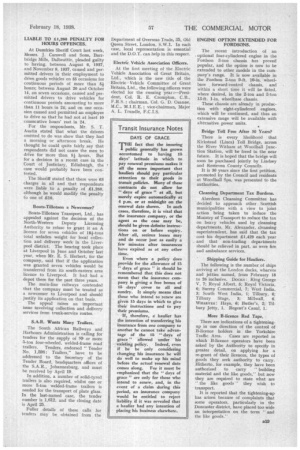Transit Insurance Notes
Page 29

If you've noticed an error in this article please click here to report it so we can fix it.
DAYS OF GRACE.
fact that the insuring Ttipetlic generally has grown accustomed to having 15 days' latitude in which to pay renewal premiums makes it all the more important that hauliers should pay particular attention to their goods in transit policies. Many of these contracts do not allow for "days of grace " at all, but merely expire automatically at 4 p.m. or at midnight on the renewal date shown. In such cases, therefore, it is vital that the insurance company, or the agent as the case may be, should be given definite instructions on or before expiry. After all, serious losses may and do occur just as easily a few minutes after insurances have expired as at any other time.
Even where a policy does provide for the allowance of 15 " days of grace" it should be remembered that this does not mean that the insurance company is giving a free bonus of 15 days' cover to all and sundry. It simply means that those who intend to renew are given 15 days in which to give their instructions and to pay their premiums.
If, therefore, a haulier has the intention of transferring his insurance from one company to another he cannot take advantage of the 15 "days of grace " allowed under his existing policy. Indeed, even if he be only considering changing his insurance he will do well to make up his mind before the actual renewal date comes along. For it must be emphasized that the " days of grace " are only for those who intend to renew, and, in the event of a claim during this period, an insurance company would be entitled to reject liability if it was revealed that a haulier had any intention of placing his business elsewhere,




















































































